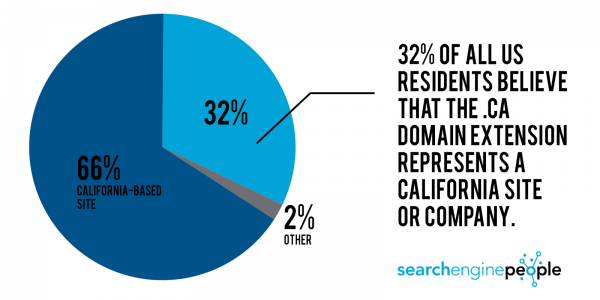After completing our first study on whether or not Americans would consider purchasing from Canadian retailers, SEP wanted to take our research one step further. In order to understand how Canadian-based websites and companies are perceived in the eyes of Americans, we wanted to ask specifically what the .ca domain extension represented to them.
We set out to find these answers using another quick Google Consumer Survey. SEP asked US residents, "What does the .ca domain extension (eg. www.website.ca) mean to you?"
Respondents were asked to choose from the following two options, or alternatively, enter their own response in a text box:
- A Canada based company/site
- A California based company/site
What Did We Learn?
Over 1500 US residents responded to our survey, conducted in September 2015. The results were somewhat unexpected – most importantly, we found that nearly a third of Americans believe that .ca represents a California-based company or website!
It seems as though this misconception is widespread throughout the country, especially in the US West. More than 37% of people who understand .ca to mean California – not Canada – live on the West Coast. More specifically, 55% of respondents in California believe that .ca represents a website from their own state! Discovering that more than half of Californians believe that .ca represents a California-based website could indicate a self-absorption bias.
For more interesting findings from our .ca domain extension survey, take a look at our full Research Summary.
What Does This Mean for You?
The fact that that one-third of all US residents believe that the .ca domain extension represents a California site or company should be a real consideration for Canadian business owners. The results of this study, when combined with our previous findings that indicate 33% of Americans would never knowingly purchase from a Canadian retailer, mean businesses should take a careful look at how their website is perceived by visitors from the United States, and perhaps consider adjusting their strategy. Whether you wish to promote your business as a Canadian-based operation, or want to be seen as an international company, these findings could influence your choice between a .ca or .com domain.
Future Areas of Research
SEP plans to continue our investigation into how Canadian-based companies and their websites are perceived by audiences south of the border. Here are some future questions we’d like to look into to get deeper insight into why the .ca domain is not widely understood to be Canadian and why US residents may hesitate to purchase from a .ca site:
- What are the specific reasons why Americans would avoid purchasing from a Canadian-based site?
- Why is the .ca domain so commonly recognized as California-based?
- Do Canadians prefer to shop on a .ca or .com website?
Did any of our findings surprise you? Have another question you’d like SEP to look into? Let us know in the comments below!


